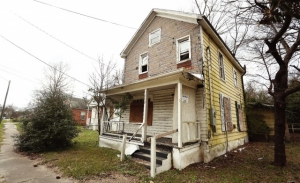Demolish
By Ethan Smith
Published in News on December 30, 2015 1:46 PM

News-Argus/CASEY MOZINGO
The structure at 613 E. Spruce St. is one of the condemned properties that will be demolished in Goldsboro in January.
Starting in January, 20 properties throughout the city will begin being demolished in an effort to clean up blight in Goldsboro.
A.K. Grading was awarded the contract by the city for the demolition work, which is expected to cost more than $100,000.
Chief Building Inspector Allen Anderson said A.K. Grading is expected to begin the work on Jan. 10 or 11, and will have 60 days from the start date to complete the demolition of the condemned properties.
"I would say these properties are in dilapidated condition, in disrepair," Anderson said. "The owners won't step up to fix them."
The following properties will be demolished:
* 3918 E. Ash St.
* 102 Bright St.
* 724 W. Chestnut St.
* 401 Creech St.
* 1208 E. Elm St.
* 404 Gulley St.
* 1108 N. John St.
* 1304 N. John St.
* 403 W. Oak St.
* 211 Shaw Court
* 605 E. Spruce St.
* 613 E. Spruce St.
* 220 Wayne Ave.
* 214 E. Elm St.
* 206 E. Elm St.
* 200 E. Elm St.
* Three houses at 200 Cemetery St.
* 504 S. John St.
The last seven properties on the list, located on Elm, John and Cemetery Street, were donated to the city by the Friends of Willowdale Cemetery organization to aid in the city's efforts of expanding the cemetery.
All 20 properties will go through the demolition process at the same time.
"My hope would be that we can tear them down and maybe adjust the lot sizes later if we need to," Anderson said. "We want to clear them off and clean up the properties, which will help protect the property values of other properties in the area."
Getting a property to where it can be demolished by the city can be an extensive process.
Each property must go through a "minimum housing" process, which is a process that enables municipalities such as Goldsboro to adopt and enforce ordinances for dwellings that are unfit for people to live in.
The difficulty with getting to a point where the city can demolish a house is that owners often don't act to fix the property in a timely manner, leaving the property in worsening condition.
"Our biggest challenge with minimum housing is mom and dad bought the house and died, and the kids went away and they live out of state, and they're not coming back, and the house is in neglect," Anderson said. "Maybe one out of four want to fix it, but the other three do not, and the house sits and that's what happens to it (it becomes dilapidated). It happens a lot here in the city of Goldsboro. We've got a lot of properties like that."
Typically the city will initially become involved in demolished or condemning a property after complaints are received by the community affairs office from citizens.
Following a complaint being received by the city, an inspector from the city will go out to the property being complained about during the next business day and take a look at the property to see what can be done about it.
Anderson said often times, in cases where the property owner lives out of state, the owner will hire somebody local to fix the property once the owner is notified of the need to fix the property by the city, and whoever is hired locally will not fix the property and instead steal copper or other valuable items out of the property.
The city will condemn the property and board up the windows, and then it will come before the Goldsboro City Council so the demolition of the property can be approved. It will then enter a public bid process so companies can provide cost estimates for the demolition, and funds can then be allocated for the work from the city's budget.
Anderson said the city is making an effort to become more proactive in getting involved before any given property reaches the point of no return where it cannot be repaired and must be demolished.
"We're out there in the trenches in the neighborhoods looking at these properties, looking at these houses, trying to be proactive about showing people the signs of minimum housing, trying to get it where it won't get to this point," Anderson said.
